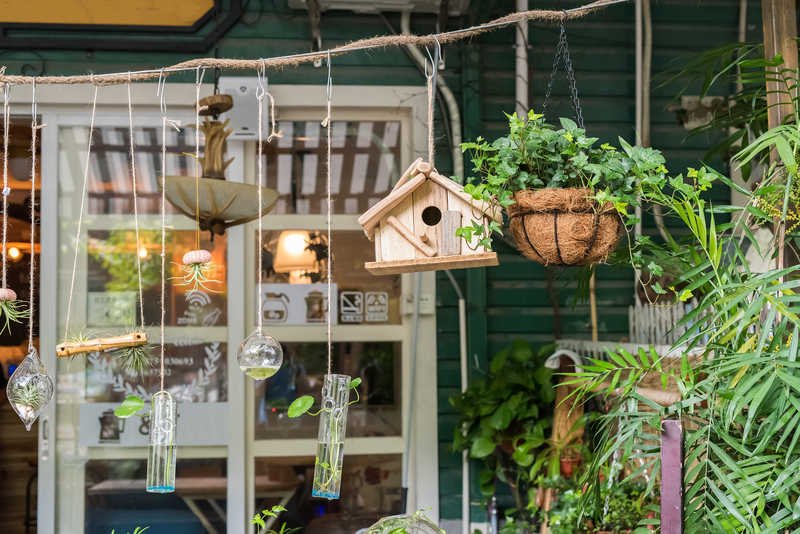Expert Advice on Boosting Your Home Recycling
Recycling at home has never been more important. With mounting concerns over environmental impact, waste management, and resource conservation, households everywhere are seeking effective ways to enhance their recycling efforts. In this comprehensive guide, we explore expert tips, strategies, and actionable steps to supercharge your home recycling. Whether you're a newcomer or a seasoned recycler, these insights will empower you to make a tangible difference. Let's dive into the world of recycling wisdom and start making your household greener today!

Why is Recycling Important?
Before we delve into advanced techniques, it's vital to understand why home recycling matters. Recycling:
- Conserves natural resources by reusing materials instead of using new raw resources
- Reduces landfill waste and pollution
- Decreases greenhouse gas emissions
- Supports a circular economy and sustainable job creation
Each time you recycle responsibly at home, you are joining a global effort to protect our planet for future generations. Small changes made by many households can lead to significant environmental improvements.
Understanding Your Local Recycling Guidelines
Not all recycling programs are created equal. To boost your home recycling efforts, start by understanding what can and can't be recycled in your local community. Municipal guidelines often differ, especially when it comes to items like plastics, glass, and electronics. Here's how you can stay informed:
- Visit your city or county's waste management website for the most updated recycling lists.
- Download printable cheat sheets to post near your recycling bin.
- Call your local recycling center if you're uncertain about a specific item.
Knowing exactly what goes in your bin is the first step to effective household recycling.
Setting Up an Efficient Home Recycling Station
Experts agree: a well-organized recycling area makes all the difference. Here are practical steps for optimizing your home setup:
Choose the Right Location
Pick a spot that's convenient yet out of the way. Popular options include:
- Under the kitchen sink
- Garage or utility room
- Pantry or closet space
Use Clearly Labeled Bins
Label your bins for easy sorting. At a minimum, have separate containers for:
- Paper and cardboard
- Plastics (check your area's accepted numbers)
- Glass
- Aluminum and metals
Color coding and bold signage can make sorting second nature, especially for kids and guests.
Keep the Area Clean and Accessible
Dirty or overfilled recycling bins can deter even the most committed recycler. Regularly empty your bins and rinse out containers to avoid odors and contamination.
Expert Tips for Effective Home Recycling
1. Rinse and Clean Recyclables
Contaminated recyclables can spoil entire loads, sending them to landfill. Always rinse food residue from plastic, glass, and metal containers. Don't forget to remove lids or caps as these often require separate processing.
2. Break Down Cardboard and Boxes
Flatten cartons and boxes before placing them in the bin. This saves valuable space and makes transportation and processing much easier.
3. Avoid "Wishcycling"
Wishcycling is when you toss questionable items into the recycling, hoping they're accepted. This actually increases contamination. When in doubt, check your local guidelines or dispose of items in the trash.
4. Don't Bag Recyclables
Plastic bags can jam machinery at recycling facilities. Place items loose in your recycling bin or use designated paper bags if permitted.
5. Recycle Non-Traditional Items Properly
- Batteries and electronics: Drop off at specialized centers or collection events
- Textiles: Donate to local charities or use textile recycling programs
- Hazardous waste: Never place in household bins; seek out hazardous waste collection days
6. Compost Food Scraps
While not technically recycling, composting is a powerful way to divert organic waste from the landfill. Set up a countertop bin for food scraps and transfer to an outdoor compost pile or a municipal pickup program if available.
Creative Approaches to Recycling at Home
Ready to take your domestic recycling to the next level? Try these creative, expert-approved approaches:
Involve Kids and Family Members
- Create fun recycling challenges for children
- Make colorful educational posters explaining what goes where
- Assign weekly "Recycling Captain" rotation roles for family members
Upcycle - Repurpose Before You Recycle
Sometimes, the best recycling is finding a new use for an item:
- Turn glass jars into storage containers
- Transform old T-shirts into cleaning rags
- Use cardboard boxes for organizing closets or crafts
Get creative! Upcycling extends the life of resources and keeps items out of the recycling stream altogether.
Host a Neighborhood Recycling Drive
Some materials, especially electronics, require special disposal. Team up with neighbors to organize a community drop-off day for hard-to-recycle items such as old batteries, light bulbs, and paint cans. This fosters community spirit and responsible waste management.
Common Recycling Mistakes (and How to Avoid Them)
Even the most enthusiastic recyclers occasionally make mistakes. Here are top mishaps and expert strategies to avoid them:
- Recycling greasy pizza boxes: Oil and food residue contaminate paper recycling. Tear off and compost the greasy section; recycle the clean remainder.
- Including plastic bags: As above, these should go to specific drop-off locations, not curbside bins.
- Tossing tanglers: Hoses, wires, and strings can tangle sorting machinery. Dispose of these separately.
- Throwing in broken glass: Only recycle glass bottles and jars; other glass types often have different melting points and are not accepted.
- Compressing cans: Flattened cans can be misread by sorting equipment. It's usually better to keep them in their original shape unless instructed otherwise by your locality.
Going Beyond the Bin: Advanced Home Recycling Strategies
Want to make an even bigger impact? Consider these next-level approaches recommended by zero-waste experts:
Buy Recycled and Recyclable Products
Support the recycling loop by choosing products made from post-consumer recycled content and those that can be easily recycled after use. Look for labels like "100% recycled" or "widely recyclable."
Reduce and Reuse
While recycling is critical, reducing single-use products and reusing items wherever possible remains the most sustainable choice for home waste management. Opt for:
- Reusable shopping and produce bags
- Stainless steel straws and water bottles
- Refillable cleaning product stations
Join Community Initiatives
Many cities offer local workshops, forums, or volunteer groups dedicated to sustainable living and improved household recycling. These are great opportunities to learn, motivate others, and stay updated on program changes and innovations.
Stay Updated on Recycling Innovations
The waste management industry is constantly evolving. Innovative technologies now allow for more types of plastics and previously challenging materials to be recycled more efficiently. Follow environmental news, subscribe to local council updates, and remain open to new possibilities.
Myths and Facts About Home Recycling
Myth: All plastics are recyclable.
Fact: Only certain types of plastic are accepted in many municipal recycling programs. Always check labeling and local guidance.
Myth: Items must be perfectly clean to be recycled.
Fact: While items should be rinsed free of food and drink, they do not have to be spotless.
Myth: Recycling uses more energy than it saves.
Fact: The energy saved by recycling aluminum, plastics, and paper far outweighs the processing energy spent.
Monitor Your Recycling Progress
Tracking your recycling habits offers great motivation and insight. Experts suggest:
- Keeping a recycling logbook or checklist
- Weighing recyclable materials each week to monitor trends
- Setting and celebrating new household recycling goals
Share your accomplishments with friends and family to encourage a wider community shift toward greener living.

Expert Q&A: Common Home Recycling Questions
Q: What can I do with hard-to-recycle plastics?
A: Research specialty recycling programs such as TerraCycle, or check with local stores (many accept plastic bags, films, and packaging). Opt for products with minimal or widely accepted packaging to reduce future issues.
Q: Is composting as important as recycling?
A: Absolutely. Composting organic material helps reduce methane emissions in landfills and creates a valuable soil resource. Many experts recommend both recycling and composting for a zero-waste household.
Q: How can apartment dwellers improve their recycling rates?
A: Maximize the use of space with compact bins and coordinate with property management to ensure recycling areas are accessible and clearly marked. Advocate for regular pickups and education for residents.
Conclusion: Make a Lasting Impact with Your Home Recycling Efforts
Boosting your home recycling is about more than tossing items in the right bin. It's an ongoing commitment to understanding guidelines, reducing contamination, embracing creativity, and getting the whole household involved. By following this expert advice, you can streamline your process, become a recycling role model in your community, and play a vital part in preserving our planet.
Start today: Audit your recycling habits, educate yourself on local policies, and implement even one of these expert tips. The benefits for your home, your neighborhood, and the environment will be unmistakable. Together, we can build a cleaner tomorrow--one recycled item at a time!